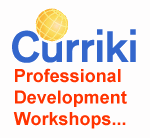 By Joshua Marks, CTO, Curriki
By Joshua Marks, CTO, Curriki
LRMI? Why should you care? While LRMI, when pronounced like a name (Ler-me), might sound like the lead singer for Motörhead, it is really an acronym for the “Learning Resource Metadata Initiative”. Now you might be more interested in rock trios than educational tech acronyms, but if you are an educator or student, you will find LRMI much more enlightening and helpful — and perhaps you will spend less time banging your head against a wall. This is why you should care.
The World Wide Web is filled with billions of documents, images, media, articles and content of all sorts. Search engines like Google and Bing do a great job of helping you find things you are likely interested in using keywords and phrases. This is particularly true for things you might buy, or people or places you want to learn about. However, anyone who has looked for learning resources on the Web sees that only a small fraction of the documents Google suggests are specifically useful in teaching and learning a topic at a given level. If you narrow your search with terms like “lesson plan” or “textbook” you get more relevant results, but still miss a lot. And you still might find lessons or books that are at the completely wrong level or skill. Recently released research underscores this discovery challenge and highlights the need for a better way to identify and find web based learning resources: http://www.lrmi.net/survey-results-show-need-for-more-targeted-results-when-searching-online-for-learning-resources.
When I was asked to join the Technical Working Group for LRMI, I believed that if LRMI simply gave us a way to search only those sites that contained content intended as learning resources, we would be in a better world. But the real task the group took on was “How can we provide a simple way to identify (tag) all Web pages that contain content intended for instructional use as ‘Learning resources’ and specifically included information about the subject, topic, how it is to be used and how it might align to local learning standards or the Common Core currently being adopted in the United States?” What if you could search for just those pages that contain activities appropriate for 10-year-olds, videos that illustrate photosynthesis, or some other specific topic?
The technical working group has completed its work and the V1.0 specification (http://www.lrmi.net/the-specification) is being adopted both by Schema.org, which is a project led by all the big search engines (Google, Yahoo, Bing, etc.), and the W3C (the group responsible for all Web standards). The next step is to get all the Web masters and publishers in the world to use it. This is where you come in. The more you tell the Web sites you use that you want them to support and tag the content with LRMI tags, the better job Google, Curriki, Bing and everyone else will do of locating the content you are interested in, without all the frustration and bad matches.
You can see this kind of tagging in action in other domains right now. For example, if you search Google for “chicken salad recipe” then under “More” select “recipes”, and then select “Search tools” you will see a bunch of very specific recipe filters like ingredients, calories, and cooking time. (It is way too hard to find in Google right now, but really helps finding a recipe.) You can image a similar set of filters for Learning Resources. In fact, you can see this functionality right now when you search for content in the Curriki community in Advanced Search, where you can filter results by subject, topic, level, language, instructional component type, rating, reviews and all other Curriki-specific metadata (metadata being information that describes content.) This is what LRMI will standardize for the entire web.
This is just part of the story.LRMI has been used by another project called The Learning Registry (http://www.learningregistry.org/), which in turn is part of a U.S. initiative called the Shared Learning Infrastructure (SLI) (http://blogs.kqed.org/mindshift/tag/shared-learning-infrastructure/). These extensions of LRMI are supported by both the $4.35 Billion Federal Race-to-the-Top grant program and the Gates Foundation. When taken together, these independent but interlinked initiatives are finally creating a critical mass of movement toward common digital material formats and an information infrastructure that enables a full transition to personalized digital instructional delivery. In fact, without these standards and the central role LRMI plays in providing a common way to define the use and target for learning assets, the dream of personalized dynamic learning systems would not be possible.
So stop banging your head looking for the instructional needle in the information haystack known as the World Wide Web. Tell everyone who publishes learning resources we need them to use and support LRMI!








Pingback: LRMI Breakdown from Joshua Marks @ Curriki Navigation North
Reblogged this on Classroom Aid and commented:
Stop banging your head looking for the instructional needle in the information haystack known as the World Wide Web. Tell everyone who publishes learning resources we need them to use and support LRMI!
If you want this tagging option to spread in the social networks at the layer of “the professor”… a plug-in is needed by WordPress multi-site admin community where the admins can enable Professors to self identify their content as Learning resources. I know that an LRMI tagger already exists, perhaps this tagger can be brought to a the WP platform in the shape of a plugin.
There are several LMS and classroom management plugins in the WP-plugins Repo. perhaps working with one of these or with several of these but building the LRMI plugin as an independent add on to these environments would be useful and bring a degree of success for adaption.
Better, you can do Fulking business, thats better idea. people will fulk you and give you some money, okey. anything else.
Humm,mmhhhhhhh
Pingback: December 2012 Standards Update | DIAGRAM Center Community
Pingback: LRMI Breakdown from Joshua Marks @ Curriki - Navigation North